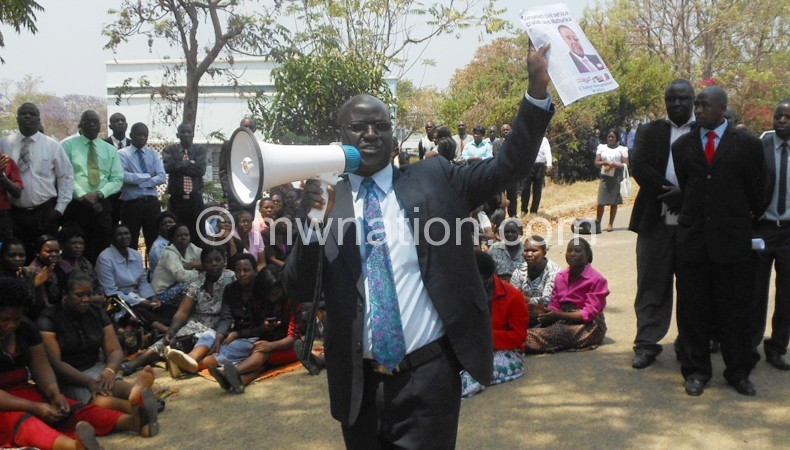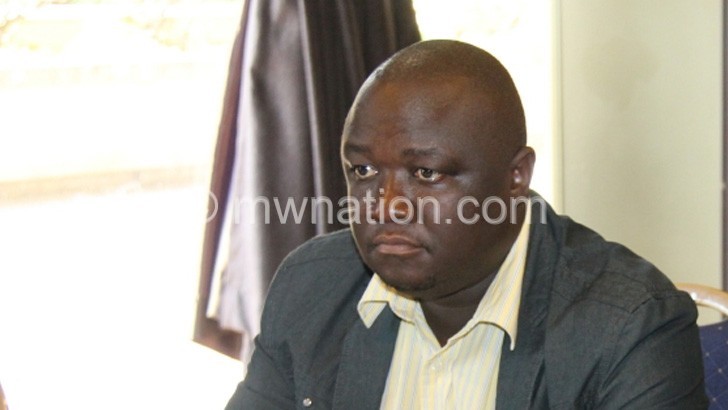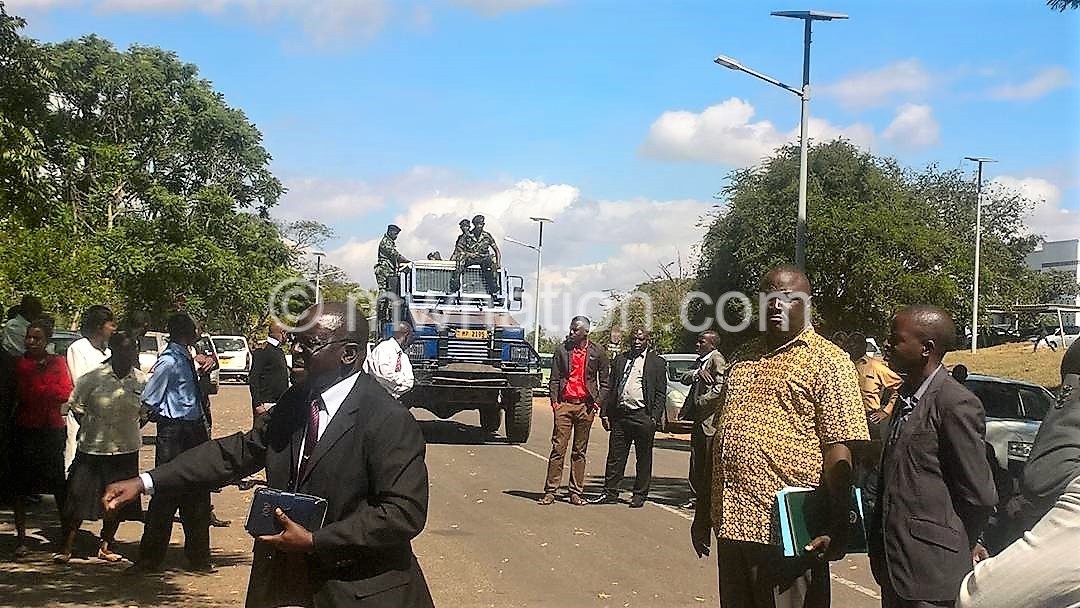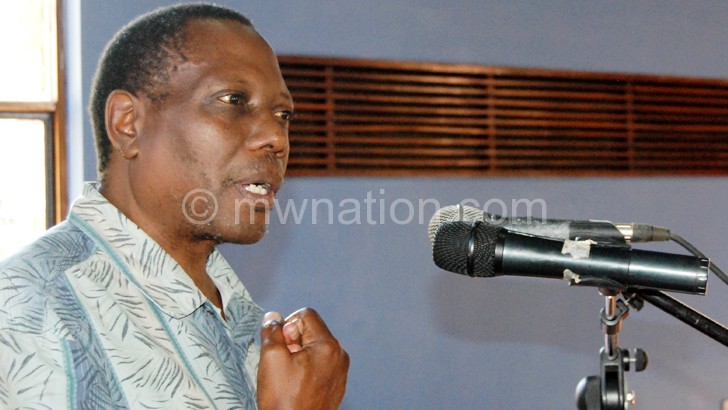Deadlock on pay rise: Govt given Tuesday ultimatum
Civil servants have given government two more days—up to Tuesday next week—to honour their demands for a 45 percent salary increase, or else they will down their tools in a crippling nationwide strike.
This was the outcome of a tough, six-hour meeting between the government negotiating team (GNT) and leaders of the civil servants on Capital Hill in Lilongwe Friday

At the meeting, the Civil Service Trade Union (CSTU) rejected the earlier 10 percent salary increase the government said it could afford giving the civil servants and threatened to begin a nationwide strike on Monday next week if government would reject the steeper salary increase.
“For now, we can say we are in a deadlock in our discussions, as the government wants to give us less than what we are demanding. We have given them two more days, to Tuesday, to agree to our terms. The nationwide strike will follow beyond this ultimatum,” declared a charged CSTU president Servance Sakala.
He was relaying the outcome of yesterday’s meeting to over 100 civil servants who had waited for hours on end to have a take-home message of either a “reasonable” salary increase or a strike by Monday, as it had been agreed earlier.
“There was only one agreement that has been resolved since we started today’s meeting… The government negotiation team has agreed that the lowest grade civil servants’ starting salary should be raised from K66 000 to K72 000; but this is not our demand, as we would like the government to raise it to K75 000,” Sakala said.

He, however, said the GNT pleaded with them that raising the salaries as was being demanded would jeopardise donors’ conditions and demands to keep the civil service wage bill to manageable levels.
But Sakala said his team’s retort was that the government should go back to donors and tell them that civil servants are suffering, hence the pay hike demand.
On his part, CSTU secretary general Madalitso Njolomole said the government has been given the Tuesday ultimatum as a final chance to honour the civil servants’ demands.
“After this, we will have no option but to effect the nation-wide strike,” he declared, attracting an approval of whistles and hand clapping.
GNT chairperson Bright Kumwembe, who is also principal secretary (PS) in the Ministry of Agriculture, Irrigation and Water Development, was yesterday economical with his comments on the meeting’s outcome.

“There is nothing to report now because we are still on the negotiation table,” he stated.The government had called yesterday’s meeting in the hope of avoiding salary increase demands and averting a civil service strike at a time when it seems cash-strapped.
Minister of Finance, Economic Planning and Development Goodall Gondwe has often warned that haphazard salary increases in the public service are detrimental and bloat the wage bill to unreasonable levels.
The civil servants’ push for a higher pay rise comes against the background of a warning by the International Monetary Fund (IMF) on the wage bill while strengthening tax compliance to mobilise enough resources in line with the country’s goals.
Following a 15 percent pay hike for the public sector last July, the public sector wage bill rose by K22 billion to K264 billion which, according to Treasury, was 23.3 percent of total expenditure in the K1.3 trillion 2016/17 National Budget.
In an interview yesterday, University of Malawi’s economics professor Ben Kaluwa warned that workers will not gain much from such pay rise demands.

He said in the current economic situation, if all workers demanded for a pay hike just like the civil servants, nobody will gain since it will drive up inflation.
“We are in a situation where if everybody gets let’s say: a 12.3 percent pay rise and shop owners or service providers do the same by increasing their goods by the same percentage, no one will gain anything. That’s why the economy never moves,” he explained.
In his presentation of the K1.2 trillion 2017/18 National Budget, expected to be passed by the start of the fiscal year on July 1, Gondwe said the civil servants would be given a 10 percent pay hike–and based on merit.
Some economists say the government is between a rock and a hard place. The government will find it hard to yield to the workers’ demands, given its stuttering economy that is just showing signs of a recovery.
But, then, the strike would also be a big operational and political disaster for the government.
All this is happening when the government is under pressure to give salary increases to university lecturers and staff in a stand-off that has paralysed tertiary education in the country, with some colleges remaining closed for six months.
Also in Lilongwe, Minister of Education, Science and Technology Emmanuel Fabiano was reportedly locked in a meeting aimed at resolving the university salary increase dispute.
By yesterday evening, there was no word of any solution to the education impasse.
Public sector bill
The public sector wage bill in the 2017/18 National Budget is expected to increase by K33 billion or about $45 million to K303.5 billion from K270.7 billion (in 2016/17) representing an increase of 10 percent.
The K303.5 billion wage bill represents about 6.1 percent of the country’s total wealth, or gross domestic product (GDP).
The wage bill has been growing steadily from K163.3 billion in 2014/15 to K226.1 in 2015/16 due to a 45 percent pay hike government succumbed to in October 2014 before reaching K270.7 billion in 2016/17.
Gondwe in his budget statement in Parliament on May 5 2017 hoped that with an expected wage creep of 3 percent, the total wage increment should rise to manageable levels of approximately 13 percent.
However, economic experts including the International Monetary Fund (IMF) have warned government that the huge portion of personal emoluments budget in the public sector is growing too fast compared to the value it is generating to the economy.
In view of this development, one of the experts recently said the increase in the wage bill would negatively impact on the sustainability of the country’s economic growth trajectory “in the current context of the already subdued economic growth environment for Malawi.”
In the current fiscal year, government is reeling from salary hike demands from public servants, notably those outside the mainstream civil service such as the Judiciary, the Anti-Corruption Bureau (ACB), the University of Malawi (Unima) and Parliament secretariat.
If government succumbs to these demands, the wage bill could rise even higher, potentially destabilising national budget implementation.
IMF resident representative Jack Ree in his reaction to the 2017/18 National Budget in May urged government to bite the bullet especially on the spending front to maintain gains on low inflation.
“I truly think that 2017/18 financial year can be a make-or-break year. It can open a door to a new trend of robust growth and low inflation—more likely now than before given the latest macroeconomic gains.
“But that would depend on whether we can bite the bullet and continue to do tough things. Then everyday Malawians will start to see real changes in their lives within two-three years,” Ree said. n





